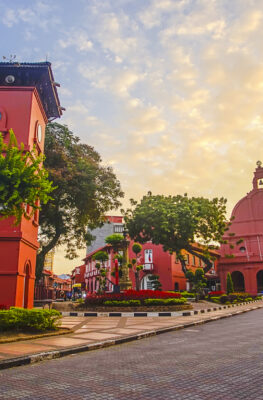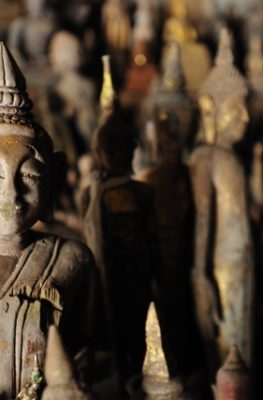Published on July 4, 2015

Senior tourists learning apsara dance moves in Cambodia. Image © Oskari Kettunen / Creative Commons
Ever look around a wind-swept beach in Thailand, or a temple-studded plain in Cambodia, and think to yourself: “I could definitely retire here”? So have thousands of other traveling seniors visiting Southeast Asia. And governments throughout the region will bend over backwards to make your plans a reality, by offering special visas for retirees and investors looking to park their cash in-country.
There’s no denying the appeal of retirement in Southeast Asia; a few countries in the region simply deliver the goods.
“I think seniors are looking for several things when they consider where to retire,” explains Nancy Parode, About.com’s resident Expert for Senior Travel. “Cost is certainly a factor, as many retirees must live on a fixed income. Seniors also look for availability of good health care that is either very low cost or is covered by their insurance policy. Beyond those key factors, seniors also want to retire in a place where they like the weather, the locals are friendly and transportation options abound.”
Nancy points to a growing boomer-age consensus that focuses on countries in Southeast Asia as havens for retirees – “In 2013, International Living magazine featured Thailand, Cambodia and Malaysia in an article emphasizing the low cost of living, relaxed lifestyle and availability of good-quality medical care in each country.”
In the following list (featuring the three aforementioned plus the Philippines), we’ll look at the things retirees will like in each one… and the hoops you have to jump before starting your life over in these countries.
Retiring in Thailand
Thailand’s heady mix of low prices, affordable health care and foreigner-friendly destinations makes the Kingdom an irresistible draw for retirees. The beaches, great food and affable locals only scratch the surface.
International-level, JCI-accredited hospitals in Bangkok and Phuket allow retirees to tap world-class medical care for a fraction of what it would cost in the West, and costs-of-living in Thailand’s most agreeable cities allow pensioners to keep up with the Kardashians even with an Archie Bunker income. (For example, prices for basic goods in Chiang Mai are almost 60% lower than comparable costs in Boston; beyond Chiang Mai, a number of senior-friendly accommodations can also be found all across the country.)
Before retiring in Thailand, you’ll need to secure a long-stay, non-immigrant “O-A” visa. Applicants must be 50 years old or older, pass a medical checkup and police records check, and deposit THB 800,000 in a Thai bank prior to your application; as an alternative to the bank requirement, you need to prove that you earn a pension worth at least THB 65,000 monthly.
The “O-A” visa is valid for one year, and can be extended annually. Visa holders must check with immigration authorities every 90 days. For more details, visit the official Thai Ministry of Foreign Affairs site.

Tour guide in Melaka, Malaysia. Image © Mike Aquino, used with permission.
Retiring in Malaysia
Malaysia is proudly multi-cultural, with Malays, Chinese and Indians living side by side in relative harmony. You’ll find their respective cultures expressed most raucously in cities like Kuala Lumpur and Penang, both havens for temples, great shopping, and even better street food.
Most locals can speak passable English, and you’ll never need worry about the language gap here. And as with neighboring Thailand, the country’s varying topography throws up beaches, mountains, jungles and caves – perfect playgrounds for the active retiree.
The Malaysian government actively courts retirees via a program called “Malaysia, my Second Home”: a long-term residency scheme that offers a renewable ten-year, multiple-entry visa to foreigners who meet certain financial criteria.
For starters, MM2H members over 50 years of age must open a fixed deposit account of at least MYR300,000 in any local bank, and can only withdraw half of that one year later. Alternatively, they can show proof of a pension earning at least MYR 10,000 a month.
The MM2H program allows members to bring their spouses and unmarried children below 21 years of age; they can also draw benefits from other incentives offered by the government under MM2H. For more information, visit the official Malaysia My Second Home site.
Retiring in the Philippines
Cheaper than Malaysia and Thailand, the Philippines also benefits from a cultural affinity with the West that few other countries in the region share. A former American colony, the Philippines still proudly wears its American affections on its sleeve, whether through its people’s general facility with the English language to the right-side driving that help the U.S.-born driver feel right at home.
You do get what you pay for; local infrastructure is nowhere near that of Malaysia or Thailand’s, but that’s certainly no issue if you choose to retire in one of the Philippines’ more out-of-the-way cities where your dollar or Euro go a long way.
The Philippines’ bar for retirees ranks among the lowest in the region. Four different classes of Special Resident Retiree’s Visa (SRRV) are available, offering some of the best returns on your investment compared to its counterparts elsewhere in Southeast Asia. SRRV holders are permitted multiple entry and exit from the Philippines; duty-free importation of up to USD7,000 worth of personal household goods; exemption from travel taxes; and the right to own a business or work in-country.
For more information on the SRRV, visit this page that explains the differences between the four types of SRRV, and this page that explains the benefits of retiring in the Philippines with an SRRV.
Retiring in Cambodia
Cambodia is the Golden Land for retirees who appreciate the country’s easy lifestyle, friendly people, low cost and low overall regulation; and who can tolerate the country’s relative lack of infrastructure beyond its major cities.
Rents cost between USD 150 and USD 500 in Phnom Penh for a one-bedroom apartment; overall, rents cost about 70 percent less than comparable rates in Boston, Massachusetts. Pensions certainly go a long way, and many retirees have leveraged their moderate incomes into thriving businesses around Phnom Penh, Siem Reap, and Sihanoukville. And while infrastructure is spotty around these parts (you’ll need to go to Thailand for certain medical procedures), other services are surprisingly good in Cambodia. Internet speeds in the cities, for starters, are blazing fast!
Unlike the other countries on this list, Cambodia has no visa program tailor-fit to retirees. However, any visitor can apply for a one-year business visa, renewable yearly, without having to show any proof of income or employment.






